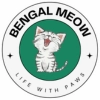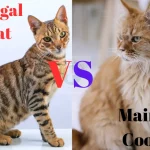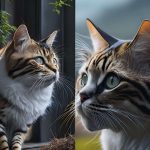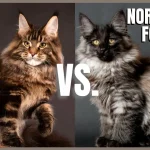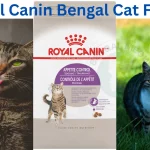Maine Coon And Cat Food : The Ultimate Guide to Feeding Your Maine Coon
Maine Coons should be fed a specialized cat food such as Royal Canin Adult Maine Coon dry cat food, which is formulated to meet the unique nutritional needs of this breed, including promoting good cardiac health and supporting healthy bones and joints. It is important to provide Maine Coons with a balanced diet that contains important nutrients like taurine, EPA, and DHA. This exclusive dry formula is specifically tailored to the Maine Coon breed.
Understanding The Nutritional Needs Of Maine Coons
Understanding the nutritional needs of Maine Coons is crucial when selecting cat food for them. Choosing the right diet can ensure they receive the essential nutrients they require for optimal health and well-being.
The Unique Dietary Requirements Of Maine Coon Cats
Maine Coon cats, known for their large size and long, luxurious coats, have unique dietary requirements that set them apart from other cat breeds. These majestic felines require a specific balance of nutrients to support their growth, maintain their optimal weight, and promote overall well-being. Understanding the nutritional needs of Maine Coon cats is crucial for their health and vitality.
The Importance Of A Balanced Diet For Maine Coons
Feeding Maine Coon cats a balanced diet is essential to meet their specific nutritional needs. A balanced diet provides the necessary nutrients, vitamins, and minerals to support their bone and joint health, promote a shiny coat, and enhance their overall immune function. It is crucial to choose high-quality cat food that is specifically formulated for Maine Coons, considering their unique requirements.
Essential Nutrients For Maine Coon Cats
To ensure the optimal health of your Maine Coon cat, their diet should contain the following essential nutrients:
- Protein: Maine Coon cats require a higher protein intake than other cat breeds. Protein helps support lean muscle mass and overall growth. Look for cat food with high-quality animal protein sources such as chicken, turkey, or fish.
- Taurine: Taurine is an amino acid that is essential for maintaining good cardiovascular health and proper eye function in Maine Coon cats. It is primarily found in animal-based proteins.
- Omega-3 and Omega-6 Fatty Acids: These essential fatty acids are responsible for maintaining a healthy coat and skin. They also support joint health and reduce inflammation. Look for cat food that contains fish oil, flaxseed, or other sources rich in Omega-3 and Omega-6 fatty acids.
- Fiber: Maine Coon cats are prone to digestive issues, such as hairballs. Including an adequate amount of fiber in their diet helps promote healthy digestion and eliminate hairballs. Look for cat food that contains natural fibers like beet pulp or psyllium husk.
- Calcium and Phosphorus: These minerals are vital for maintaining strong bones and teeth in Maine Coon cats. Ensure the cat food you choose provides an appropriate balance of calcium and phosphorus for their optimal growth and development.
- Vitamins and Minerals: Maine Coon cats need a variety of vitamins and minerals to support their overall health, including vitamins A, B, D, E, and K, as well as minerals like zinc, iron, and selenium. Feeding them a nutritionally complete cat food will help provide these essential nutrients.
Choosing The Right Food For Your Maine Coon
Choosing the right food for your Maine Coon is crucial for their health and well-being. With their specific dietary needs, it’s important to find cat food that is formulated for Maine Coons to ensure they get the nutrients they need.
Wet Vs. Dry Food: Which Is Best For Maine Coons?
When it comes to choosing the right food for your beloved Maine Coon, you may find yourself wondering whether to opt for wet or dry food. Both options have their pros and cons, and it ultimately depends on your cat’s individual needs and preferences.
Wet food provides a higher moisture content, which can be beneficial for Maine Coons, as they are prone to dehydration. It can also help maintain urinary tract health and prevent issues such as kidney stones. Additionally, wet food can be easier for older cats with dental issues to consume, as it is softer and more palatable.
Dry food, on the other hand, is more convenient and cost-effective. It can be left out for longer periods without spoiling, making it a good option for busy pet owners. Dry food also helps to promote dental health by scraping away plaque and tartar as the cat chews. However, it is essential to ensure your Maine Coon drinks plenty of water alongside dry food to prevent dehydration.
| Advantages | Disadvantages |
|---|---|
| Higher moisture content | Convenience and cost-effectiveness |
| Helps maintain urinary tract health | Potential dental issues |
| Softer and more palatable for older cats | Needs additional water intake |
Reading And Understanding Cat Food Labels
When choosing the right food for your Maine Coon, it’s crucial to read and understand the labels on cat food packaging. The information provided will help you make an informed decision based on your cat’s specific dietary needs.
The following are the key elements to look for on cat food labels:
- Protein: Maine Coons require a diet with a high protein content to support their active lifestyles. Look for foods with animal protein sources listed among the top ingredients.
- Fats: Healthy fats are vital for maintaining a Maine Coon’s skin and coat health. Opt for foods that contain omega-3 and omega-6 fatty acids.
- Carbohydrates: While Maine Coons are obligate carnivores, they may benefit from a small amount of easily digestible carbohydrates in their diet. Look for whole grains such as brown rice or sweet potatoes.
- Fillers and artificial additives: Avoid cat foods that contain excessive fillers like corn, wheat, or soy, as these offer limited nutritional value. Also, steer clear of artificial colors, flavors, and preservatives.
Ingredients To Look For In Maine Coon Cat Food
When selecting cat food for your Maine Coon, it’s essential to have a good understanding of the ingredients to ensure they meet your cat’s specific nutritional requirements. Look for the following ingredients in Maine Coon cat food:
- High-quality animal protein sources, such as chicken, turkey, or fish. These provide essential amino acids for muscle development and overall health.
- Omega-3 and omega-6 fatty acids for healthy skin and coat.
- Taurine, an essential amino acid for heart health.
- Antioxidants like vitamins C and E, which support the immune system.
- Probiotics or other digestive enzymes to promote healthy gut flora.
Selecting the right food for your Maine Coon is crucial to ensure their overall health and well-being. Consider their age, activity level, and any specific dietary requirements they may have when making your choice. Consulting with your veterinarian can also provide valuable insight and guidance in selecting the best diet for your furry friend.
Feeding Guidelines For Maine Coon Cats
Feeding your Maine Coon cat the right diet is essential for their health and well-being. Maine Coons are known for their large size and require a diet that caters to their specific nutritional needs. In this section, we will discuss the feeding guidelines for Maine Coon cats, including determining the correct portion size, establishing a feeding schedule, and providing tips for feeding Maine Coon kittens.
Determining The Correct Portion Size For Your Maine Coon
Due to their large build, Maine Coon cats generally require more food than average-sized cats. However, it is important to determine the correct portion size to avoid overfeeding or underfeeding. Here are some factors to consider when determining the portion size:
- Weight: Take into account your Maine Coon’s weight. The general guideline is to feed about 20 calories per pound of body weight per day. Consult with your veterinarian to determine the specific caloric needs of your cat.
- Activity level: Consider your cat’s activity level. Maine Coons are typically active cats and may require more calories if they engage in regular exercise or play.
- Age: Age plays a role in portion size as well. Kittens require more calories as they are growing, while older cats may have slower metabolism and need fewer calories.
- Food type: The type of food you feed your Maine Coon also affects portion size. Different brands and formulas may have different recommended serving sizes. Be sure to follow the feeding guidelines provided by the manufacturer.
Establishing A Feeding Schedule For Your Maine Coon
Creating a consistent feeding schedule for your Maine Coon is important to maintain a healthy eating routine. Here are some tips to establish an effective feeding schedule:
- Divide meals: Instead of free-feeding, divide your cat’s daily portion into multiple meals. This helps prevent overeating and allows for better digestion.
- Stick to a routine: Cats thrive on routine, so try to feed your Maine Coon at the same time each day. This helps regulate their hunger and keeps their metabolism in check.
- Monitor feeding behavior: Pay attention to your cat’s appetite and adjust the feeding schedule accordingly. If your Maine Coon is consistently leaving food behind or acting excessively hungry, you may need to adjust portion sizes or meal frequencies.
- Provide fresh water: Always ensure your Maine Coon has access to clean, fresh water throughout the day. Hydration is important for their overall health.
Tips For Feeding Maine Coon Kittens
Maine Coon kittens have different nutritional needs compared to adult cats. Here are some tips for feeding Maine Coon kittens:
- Kitten-specific food: Choose a high-quality kitten food specifically formulated for Maine Coon kittens. These foods provide the necessary nutrients for their growth and development.
- Feed frequently: Kittens have smaller stomachs and higher energy needs. Provide frequent small meals throughout the day to meet their nutritional requirements.
- Transition gradually: If you’re switching from one brand or type of food to another, do it gradually over the course of a few days to avoid upsetting your kitten’s stomach.
- Monitor weight: Regularly weigh your Maine Coon kitten to ensure they are growing at a healthy rate. Consult with your veterinarian if you have any concerns about their weight or growth.
By following these feeding guidelines, you can ensure that your Maine Coon cat receives the proper nutrition and maintains a healthy weight. Remember to consult with your veterinarian for personalized advice and recommendations based on your cat’s unique needs.
Common Dietary Issues In Maine Coon Cats
Common dietary issues in Maine Coon cats can arise from improper cat food choices. It is important to feed them specific Maine Coon cat food that meets their nutritional needs to avoid potential health problems.
Food Allergies And Intolerances In Maine Coons
Maine Coon cats, known for their large size and affectionate nature, can also suffer from food allergies and intolerances, just like any other cat breed. These allergies and intolerances can cause various symptoms such as itchy skin, gastrointestinal upset, and even behavioral changes. It’s important for Maine Coon owners to be aware of these issues and take necessary steps to manage them.
Managing Weight And Obesity In Maine Coon Cats
Maine Coon cats have a propensity for weight gain due to their large size and slow metabolism. This breed is prone to becoming overweight or obese if their diet is not closely monitored. Obesity can lead to various health problems, including joint issues, diabetes, and heart disease. Therefore, it’s crucial to pay attention to your Maine Coon’s weight and provide them with a balanced diet that meets their nutritional needs while preventing excessive weight gain.
Preventing Urinary Tract Issues In Maine Coons
Maine Coon cats are prone to urinary tract issues, such as urinary tract infections and bladder stones. These issues can cause discomfort, pain, and even life-threatening complications if left untreated. One way to prevent urinary tract problems in Maine Coons is by providing them with a diet that promotes urinary health. This includes feeding them cat food that is specifically formulated to control pH levels and prevent the formation of crystals or stones in the urinary tract.
Maine Coon cats may experience common dietary issues such as food allergies and intolerances, weight management, and urinary tract problems. By being aware of these issues and taking appropriate measures, such as feeding them a balanced diet and seeking veterinary advice when necessary, you can ensure the overall health and well-being of your Maine Coon companion.
Supplements And Treats For Maine Coon Cats
Maine Coon cats are known for their large size, striking appearance, and friendly demeanor. As a responsible pet owner, it’s important to provide them with the proper nutrition they need to thrive. In addition to a balanced diet, incorporating supplements and treats into their routine can offer additional health benefits and make mealtime more enjoyable. In this article, we will explore the recommended supplements for overall health and well-being, selecting healthy treat options, and how to introduce new supplements and treats to your Maine Coon.
Recommended Supplements For Overall Health And Well-being
Supplements can be a great addition to your Maine Coon’s diet to support their overall health and well-being. Here are some recommended supplements:
- Omega-3 Fatty Acids: Omega-3 fatty acids are essential for maintaining healthy skin and coat, reducing inflammation, and supporting joint health. Look for fish oil supplements specifically formulated for cats, and follow the recommended dosage instructions.
- Probiotics: Probiotics promote a healthy digestive system by balancing the gut flora. They can help prevent digestive issues and boost the immune system. Choose a high-quality probiotic supplement designed for cats, and introduce it gradually to avoid any stomach upset.
- Joint Supplements: Maine Coons are prone to joint issues due to their size. Glucosamine and chondroitin supplements can help support joint health and mobility. Consult with your veterinarian to determine the best supplement for your Maine Coon’s specific needs.
Selecting Healthy Treat Options For Your Maine Coon
Treating your Maine Coon doesn’t have to compromise their health. Here’s how to select healthy treat options:
- Read the Labels: When choosing treats for your Maine Coon, read the labels carefully. Look for treats that are made from high-quality, natural ingredients, and avoid those with excessive fillers, artificial flavors, and preservatives.
- Protein-Rich Treats: Maine Coons are carnivores, so opt for treats that are rich in animal protein. Treats made from real meat or freeze-dried options are excellent choices, as they provide a good source of protein and are highly palatable.
- Avoid Bland Fillers: Stay away from treats that contain fillers like corn, wheat, and soy, as they offer little nutritional value for your Maine Coon and can contribute to digestive issues.
How To Introduce New Supplements And Treats To Your Maine Coon
Introducing new supplements and treats to your Maine Coon should be done gradually to avoid any digestive upset. Follow these steps:
- Start Slow: Begin by offering a small amount of the new supplement or treat as an addition to their regular meal or as a separate treat. Monitor their reaction and any changes in their digestion.
- Monitor for Allergies or Sensitivities: Keep an eye out for any signs of allergies or sensitivities, such as vomiting, diarrhea, or skin issues. If you notice any adverse reactions, discontinue use and consult with your veterinarian.
- Gradually Increase Amount: If your Maine Coon tolerates the new supplement or treat well, gradually increase the amount over a few days until reaching the recommended dosage or desired treat portion.
Remember, supplements and treats should not replace a balanced diet but rather complement it. Always consult with your veterinarian before introducing any new supplements or treats to ensure they are suitable for your Maine Coon’s specific needs. By providing them with the right supplements and treats, you can contribute to their overall health and happiness!

Credit: www.amazon.com
Frequently Asked Questions For Maine Coon And Cat Food
Can Maine Coons Eat Normal Cat Food?
Maine Coons can eat normal cat food. However, it is recommended to feed them food specifically formulated for their breed, like Royal Canin Adult Maine Coon dry cat food, which contains important nutrients for their specific needs.
What Cat Food Is Good For Maine Coon Cats?
Royal Canin Adult Maine Coon dry cat food is the best option for Maine Coon cats. It is specifically designed to meet their nutritional needs, promoting good cardiac health and supporting healthy bones and joints.
Can Maine Coons Eat Dry Cat Food?
Yes, Maine Coons can eat dry cat food. Royal Canin Adult Maine Coon dry cat food is recommended for this breed as it contains essential nutrients like taurine for cardiac health and EPA and DHA for bones and joints.
Conclusion
To ensure your Maine Coon remains healthy and well-nourished, it is crucial to provide them with the right cat food. Royal Canin Adult Maine Coon dry cat food is specifically designed to cater to their unique nutritional needs. Packed with essential nutrients like taurine, EPA, and DHA, it promotes good cardiac health and supports healthy bones and joints.
Remember, a well-balanced diet is key to keeping your Maine Coon happy and thriving.
